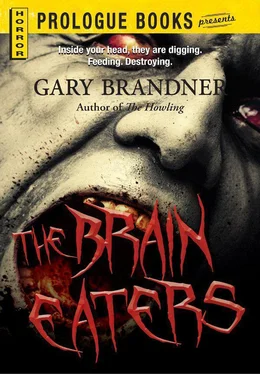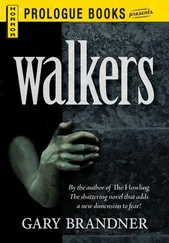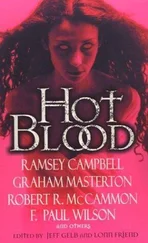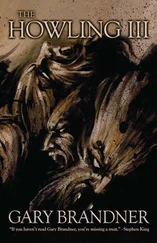“I’d like to have the specialists themselves tell the reporters about it. It was Dr. Pena and Dr. Knight who developed the test, wasn’t it?”
“Yes, it was, but I could not possibly spare them for — ”
“Half an hour,” Corey said. “If we give the pool reporters half an hour of real news coming from somebody with real credentials, they’ll be a lot easier to live with.”
Dr. Kitzmiller sighed heavily. “Everywhere I turn today I meet with opposition. Very well, take my doctors, but not one minute more than your half hour, or I swear I will bar you from the laboratories, too.”
“It’s a deal.”
Corey put out a hand, but Kitzmiller ignored it and hurried back to his teammates.
• • •
Drs. Pena and Knight proved to be an unqualified hit with the reporters. Marcus Pena was relaxed and friendly, with the unlined face of a teenager and a respect for the intelligence of his audience. Dorothea Knight said little, but she had a sensational chest, which was more than enough for the news-starved media. At last television had something to show pictures of.
After the briefing was over, Corey returned the two doctors to Kitzmiller’s care and retired to his cramped little room. He turned the lamp to the wall, sat down on the bed, and pulled off his shoes. Then he lay back with his hands clasped behind his head and stared at the ceiling. A spider that had somehow gotten into the pesticide palace was optimistically spinning a web up in one corner. While Corey’s eyes followed the progress of the little creature, his mind was many miles away.
A knock at the door.
“Enter.”
The door opened, and Dena Falkner stood there. Her caramel-colored hair was down and was given a soft halo effect by the brighter light out in the hall.
“Hi,” she said.
“Hi.”
“Want to talk about it?”
He hesitated, then said, “Not really.”
“Okay.” She turned to leave.
“No, wait, Dena. I guess I do want to talk.”
She came back in and closed the door.
“How did you know?” he asked.
“You’re different somehow.”
“Lou Zachry said almost the same thing to me. Even Kitzmiller. I must be easy to read.”
“You’re not so tough.”
“In more ways than one,” he said. “I wish I’d thought to pick up some bourbon while I was in Milwaukee.”
Dena pulled a flask from her laboratory smock and held it up for his inspection. “Is Canadian all right?”
“What’s that, a specimen bottle?”
“It’s Canadian Club. But if you’re squeamish — ”
“No,” he said quickly. “Canadian is terrific. And you must be clairvoyant.”
“ Sympatico ,” she corrected.
Corey produced two tumblers. They poured the whiskey, sat down side by side on the bed, and toasted each other silently.
“Doc Ingersoll’s dead,” he said.
Dena touched his hand.
“He shot himself today when he knew the brain eaters were in him.”
“Oh, Corey, I’m so sorry.”
“I was with him this morning. I was right there in Doc’s apartment when those little bastards were eating him up. The pain he felt must have been unspeakable. And I didn’t even notice.”
He paused for a swallow. Dena watched him silently.
“I was too wrapped up in my own miserable little complaints to notice that my best friend was in agony. How’s that for sensitive?”
“We’re all kind of unfocused these days,” she said.
“I can’t blame it on ‘these troubled times,’” he said. “It’s me. It’s the way I’ve always been. I’ve spent the better part of my life looking for the Big Story. Not because I gave a damn for the story but because it was going to make Corey Macklin rich and famous. A celebrity. Doc told me I was going to be a celebrity. That’s all the brain eaters meant to me. They were my Big Story. So a few people died. I couldn’t help that. So then a lot of people died. I still didn’t understand. Then Doc died. The one man in the world who was my friend. He damn near died in front of my eyes, and I didn’t see it. Some friend.”
Dena poured more whiskey into their tumblers. She said, “Okay, so you were a bastard. What are you going to do about it?”
“When I came back here, I was going to quit.”
“That’s no answer.”
“I see that now. I guess I’ll hang around and do whatever I can to be useful. Who knows? We might beat this thing yet.”
“Who knows.” She grinned at him.
“You sure don’t allow a guy much time for self-pity.”
“Not on my booze.”
“What time do you have to be back?”
Dena’s smile softened. “There’s no bed check tonight.”
He took the glass from her hand, set it down along with his on the night table, and drew her into his arms.
Anton Kuryakin looked around him with a deep sadness. A great country was being brought to its knees. The streets of the cities were clogged with debris and abandoned cars. Shops were closed and shuttered. Others had their windows smashed out and stood open and gutted like dead animals.
For the most part, people stayed off the dying streets. Those who had to be out hurried along, huddled in upon themselves, avoiding contact with any others they might meet. The eyes of many of the people were already dead.
Worst were the screamers. The wild, agonized victims of the brain eaters. They ran along the streets, hopelessly trying to rip the parasites from inside their heads. People recognized them now for what they were. They knew the terrible violence such victims were capable of, and they shunned them like the lepers of ancient times.
Kuryakin stood at the intersection of Michigan Avenue and Milwaukee and looked about him at the dying city without pleasure. He had always believed that the superiority of the Soviet system would one day bring down the Western democracies, but it gave him no enjoyment to see the old adversary beaten in this terrible way.
After his flight left San Francisco, there was the short period when they were airborne and everything might have been normal. Normal, that is, except for the grim tension on the faces of the passengers and the crew and the soft sobbing of an old woman in the seat behind him. At least they were isolated at sixteen thousand feet from the ugly reality on the ground. The fragile sense of normality collapsed when they landed.
After that, Kuryakin had seen the situation become rapidly more desperate. There was near chaos at O’Hare International Airport in Chicago. Flights to all points were being canceled, People fought for seats on airplanes that would never take off. There was no reliable information on what was coming in, and the anxiety in the faces of those who waited was awful to see.
While people dashed frantically and pointlessly from counter to counter, Kuryakin placed himself stolidly in line at the shuttle-flight boarding gate. Thus he managed to get a seat on one of the last flights to take off for Milwaukee.
The scene at Mitchell Field was a smaller version of O’Hare. Everybody was in a panic to leave the city, but nobody knew where he wanted to go. With other countries closing their borders to Americans, they were trapped with the brain eaters.
Getting from the airport to downtown Milwaukee had been the easiest part of Kuryakin’s journey. Almost all the traffic was in the other direction, and the few taxis that were still operating were glad to take a fare back into the city. Getting from Milwaukee to his final destination was proving to be much more difficult.
“Can you drive me to the Biotron factory?” he asked the cabdriver who had brought him from Mitchell Field.
“Where’s that?” the man asked, looking back at his passenger and running a critical eye over his too-short haircut and the unstylish drape of his suit.
Читать дальше












